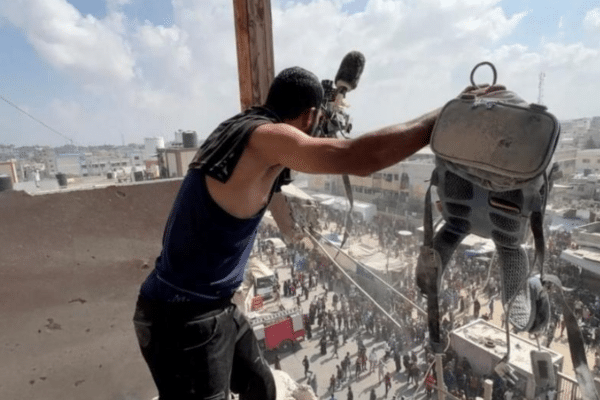
On Monday, Israeli airstrikes hit the Nasser hospital in Khan Younis, killing at least 20 people, including five journalists and several medical workers. The incident has drawn international condemnation and a direct response from former U.S. President Donald Trump.
The Hospital Incident in Khan Younis
According to hospital officials, the building was struck twice in just minutes. The second strike killed rescue workers and medics who had rushed in to assist those wounded by the first blast.
Verified footage from Egyptian television, reviewed by Reuters, shows rescuers searching the hospital’s upper floors when the second strike hit.
Journalists killed in the hospital strike include:
- Mariam Abu Dagga – freelance journalist, Associated Press contributor
- Mohammed Salama – Al Jazeera journalist
- Moaz Abu Taha – freelance reporter, worked with Reuters and others
- Ahmed Abu Aziz – contributor to Middle East Eye
Several medical staff caring for patients were also killed in the blast.
Trump’s Reaction to the Gaza Hospital Strike
Asked about the incident during an Oval Office briefing, former President Donald Trump said:
“I’m not happy about it. I don’t want to see it. At the same time, we have to end that whole nightmare. I’m the one that got the hostages out.”
Trump criticized the attack but stressed the need to find a resolution to the ongoing conflict.
Israel’s Official Response
Israeli Prime Minister Benjamin Netanyahu described the hospital strike as a “tragic mishap” and insisted that Israel “values the work of journalists, medical staff, and all civilians.”
The Israel Defense Forces (IDF) confirmed striking the area but denied deliberately targeting civilians.
IDF spokesperson Effie Defrin stated:
“The IDF does not intentionally target civilians. The IDF acts to mitigate harm to uninvolved individuals as much as possible while maintaining the safety of IDF troops.”
Reports in Israeli media suggested that the shells were intended to destroy a surveillance camera located on the hospital roof.
Rising Toll on Journalists and Medical Workers
The Committee to Protect Journalists (CPJ) reported that at least 192 journalists have been killed in Gaza since the war began, 189 of them Palestinian.
The United Nations estimates that more than 1,500 health workers have been killed by Israeli strikes in the same period.
Sara Qudah, CPJ’s regional director, condemned the deaths, calling the attacks:
“the most horrific attacks the press has ever faced in recent history. These murders must end now. The perpetrators must no longer be allowed to act with impunity.”
Global Reaction and Condemnation
French President Emmanuel Macron called the hospital strike “intolerable” and emphasized that:
- Civilians must be protected in all circumstances.
- Journalists must be free to cover conflicts without fear of being targeted.
International organizations and human rights groups continue to demand independent investigations into the strikes.
Context of the Gaza War
The war began on October 7, 2023, after the Hamas terror attack on Israel, which killed 1,200 people and resulted in around 250 hostages.
Since then, Gaza’s Health Ministry has reported more than 62,000 Palestinians killed. The IDF’s own figures estimate that about 83% of the deaths are civilians.
Due to limited access, Gaza’s Health Ministry remains the primary source of casualty data, though international bodies caution that the figures cannot be independently verified.
Conclusion
The Israeli hospital strike in Gaza has intensified scrutiny of Israel’s military strategy, raising urgent questions about civilian protection and press freedom.
With rising casualties among journalists, medics, and civilians, international calls for accountability and protection are growing louder. The tragedy underscores the devastating human cost of the conflict and the need for urgent diplomatic efforts to prevent further loss of innocent lives.
